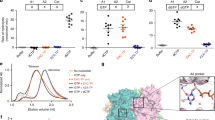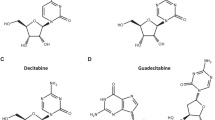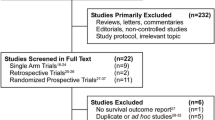Abstract
Since HMAs were recommended for treatments in AML and MDS, we wondered whether HMAs could provide similar benefit to AML and intermediate/high-risk MDS under the direction of next-generation sequencing. Here we retrospectively analyzed the prognosis of 176 AML and 128 intermediate/high-risk MDS patients treated with HMAs or non-HMA regimens. For AML, HMAs regimen was related to better CR rate compared with non-HMA regimen in elder cohort, while the situation was the opposite in younger cohort. In consolidation phase, EMM (+) patients could benefit from HMAs regimen. Relapsed AML patients receiving HMAs regimen rather than non-HMA regimen had better post-relapse survival. Multivariate analysis identified HMA regimen as an independent prognostic factor for OS in EMM (+) cohort. For intermediate/high-risk MDS patients not undergoing HSCT, however, HMA regimen showed no survival advantage in EMM (+) cohort and was conversely associated with shorter survival in EMM (-) cohort compared with non-HMA regimen. And among those undergoing HSCT, HMA prior to HSCT predicted poor prognosis compared with upfront HSCT regardless of the existence of EMMs. Therefore, HMAs had better therapeutic value in AML rather than in intermediate/high-risk MDS based on EMMs.





Similar content being viewed by others
Data availability
The data that support the findings of this study are available on request from the corresponding author. The data are not publicly available due to privacy.
References
Steensma DP (2018) Myelodysplastic syndromes current treatment algorithm 2018. Blood Cancer J 8(5):47
Daver N, Cortes J, Kantarjian H et al (2016) Acute myeloid leukemia: advancing clinical trials and promising therapeutics. Expert Rev Hematol 9(5):433–45
Kihara R, Nagata Y, Kiyoi H et al (2014) Comprehensive analysis of genetic alterations and their prognostic impacts in adult acute myeloid leukemia patients. Leukemia 28:1586–1595
Papaemmanuil E, Gerstung M, Bullinger L et al (2016) Genomic Classification and prognosis in Acute Myeloid Leukemia. N Engl J Med 374(23):2209–21
Gaidzik VI, Paschka P, Späth D et al (2012) TET2 mutations in Acute Myeloid Leukemia (AML): Results From a Comprehensive Genetic and Clinical Analysis of the AML Study Group. J Clin Oncol 30(12):1350–7
Greenberg P, Cox C, LeBeau MM et al (1997) International scoring system for evaluating prognosis in myelodysplastic syndromes. Blood 89:2079–88
Yang YT, Chiu YC, Kao CJ et al (2018) The prognostic significance of global aberrant alternative splicing in patients with myelodysplastic syndrome. Blood Cancer J 8(8):78
Haferlach T, Nagata Y, Grossmann V et al (2014) Landscape of genetic lesions in 944 patients with myelodysplastic syndromes. Leukemia 28(2):241–7
Medeiros BC, Fathi AT, DiNardo CD et al (2017) Isocitrate dehydrogenase mutations in myeloid malignancies. Leukemia 31(2):272–281
Ley TJ, Ding L, Walter MJ, McLellan MD, Lamprecht T, Larson DE et al (2010) DNMT3A mutations in acute myeloid leukemia. N Engl J Med 363(25):2424–33
Liang S, Zhou X, Pan H, Yang Y, Shi L, Wang L (2019) Prognostic value of DNMT3A mutations in myelodysplastic syndromes: a meta-analysis. Hematology 24(1):613–622
Abdel-Wahab O, Mullally A, Hedvat C, Garcia-Manero G, Patel J, Wadleigh M et al (2009) Genetic characterization of TET1, TET2, and TET3 alterations in myeloid malignancies. Blood 114(1):144–7
Bejar R, Stevenson KE, Caughey B, Lindsley RC, Mar BG, Stojanov P et al (2014) Somatic mutations predict poor outcome in patients with myelodysplastic syndrome after hematopoietic stem-cell transplantation. J Clin Oncol 32(25):2691–8
Lin Y, Wang Y, Zheng Y, Wang Z, Wang Y, Wang S (2020) Clinical characteristics and prognostic study of adult acute myeloid leukemia patients with ASXL1 mutations. Hematology 25(1):446–456
Chen M, Liu J, Chao H, Qin W, Jiang N, Lu X et al (2020) Analysis of ASXL1 gene variant in patients with myelodysplastic syndrome. Zhonghua Yi Xue Yi Chuan Xue Za Zhi 37(2):110–115
Garcia-Manero G, Fenaux P (2011) Hypomethylating agents and other novel strategies in myelodysplastic syndromes. J Clin Oncol 29(5):516–23
Yun S, Vincelette ND, Abraham I et al (2016) Targeting epigenetic pathways in acute myeloid leukemia and myelodysplastic syndrome: a systematic review of hypomethylating agents trials. Clin Epigenetics 14(8):68
Hiller JK, Schmoor C, Gaidzik VI et al (2017) Evaluating the impact of genetic and epigenetic aberrations on survival and response in acute myeloid leukemia patients receiving epigenetic therapy. Ann Hematol 96:1–7
Traina F, Visconte V, Elson P et al (2014) Impact of molecular mutations on treatment response to DNMT inhibitors in myelodysplasia and related neoplasms. Leukemia 28:78–87
Li HH, Li F, Gao CJ, Huang WR, Bo J, Dou LP et al (2017) Similar incidence of severe acute GVHD and less severe chronic GVHD in PBSCT from unmanipulated, haploidentical donors compared with that from matched sibling donors for patients with haematological malignancies. Br J Haematol 176(1):92–100
Li H, Durbin R (2009) Fast and accurate short read alignment with Burrows-Wheeler transform. Bioinformatics 25:1754–60
Cibulskis K, Lawrence MS, Carter SL et al (2013) Sensitive detection of somatic point mutations in impure and heterogeneous cancer samples. Nat Biotechnol 31:213–9
Wang K, Li M, Hakonarson H (2010) ANNOVAR: functional annotation of genetic variants from high-throughput sequencing data. Nucleic Acids Res 38:e164
Joober R (2011) The 1000 Genomes Project: deep genomic sequencing waiting for deep psychiatric phenotyping. J Psychiatry Neurosci 36:147–9
Forbes SA, Bindal N, Bamford S et al (2011) COSMIC: mining complete cancer genomes in the Catalogue of Somatic Mutations in Cancer. Nucleic Acids Res 39:D945-50
Cashen AF, Schiller GJ, O’Donnell MR et al (2010) Multicenter, phase II study of decitabine for the first-line treatment of older patients with acute myeloid leukemia. J Clin Oncol 28(4):556–61
DiNardo Courtney D, Pratz Keith, Pullarkat Vinod et al (2019) Venetoclax combined with decitabine or azacitidine in treatment-naive, elderly patients with acute myeloid leukemia. Blood 133(1):7–17
Estey EH (2013) Epigenetics in clinical practice: the examples of azacitidine and decitabine in myelodysplasia and acute myeloid leukemia. Leukemia 27(9):1803–12
Bernal T, Martínez-Camblor P, Sánchez-García J et al (2015) Effectiveness of azacitidine in unselected high-risk myelodysplastic syndromes: results from the Spanish registry. Leukemia 29(9):1875–81
Thol F, Kade S, Schlarmann C et al (2012) Frequency and prognostic impact of mutations in SRSF2, U2AF1, and ZRSR2 in patients with myelodysplastic syndromes. Blood 119(15):3578–3584
Wu SJ, Tang JL, Lin CT et al (2013) Clinical implications of U2AF1 mutation in patients with myelodysplastic syndrome and its stability during disease progression. Am J Hematol 88(11):E277-82
Malcovati L, Karimi M, Papaemmanuil E et al (2015) SF3B1 mutation identifies a distinct subset of myelodysplastic syndrome with ring sideroblasts. Blood 126(2):233–41
Qin Y, Kuang P, Zeng Q et al (2019) Hypomethylating agents for patients with myelodysplastic syndromes prior to hematopoietic stem cell transplantation: a systematic review and meta-analysis. Ann Hematol 98(11):2523–2531
Funding
This work was partially supported by grants from the Chinese National Major Project for New Drug Innovation (2019ZX09201002003), National Natural Science Foundation of China (82030076, 82070161, 81970151, 81670162 and 81870134), Shenzhen Science and Technology Foundation (JCYJ20190808163601776, JCYJ20200109113810154), Shenzhen Key Laboratory Foundation (ZDSYS20200811143757022), Sanming Project of Shenzhen (SZSM202111004).
Author information
Authors and Affiliations
Corresponding authors
Ethics declarations
Ethics approval and consent to participate
The study was conducted in accordance to Helsinki declaration and written informed consents were acquired.
Conflict of interest
The authors declare no competing interests.
Additional information
Publisher's Note
Springer Nature remains neutral with regard to jurisdictional claims in published maps and institutional affiliations.
Supplementary information
Below is the link to the electronic supplementary material.
Rights and permissions
Springer Nature or its licensor (e.g. a society or other partner) holds exclusive rights to this article under a publishing agreement with the author(s) or other rightsholder(s); author self-archiving of the accepted manuscript version of this article is solely governed by the terms of such publishing agreement and applicable law.
About this article
Cite this article
Wang, R., Xu, Y., Wang, B. et al. Hypomethylating agents (HMAs) show benefit in AML rather than in intermediate/high-risk MDS based on genetic mutations in epigenetic modification (EMMs): from a retrospective study. Ann Hematol 103, 61–71 (2024). https://doi.org/10.1007/s00277-023-05438-5
Received:
Accepted:
Published:
Issue Date:
DOI: https://doi.org/10.1007/s00277-023-05438-5




